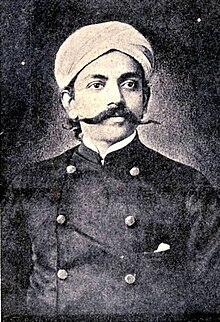G. P. Pillai
Barrister G. P. Pillai | |
|---|---|
 | |
| Born | Govindan Parameswaran Pillai February 2, 1864 Pallippuram, Thiruvananthapuram |
| Died | May 21, 1903 (aged 39) |
| Occupation | Social reformer |
Govindan Parameswaran Pillai, of Pallichal (1864–1903), commonly known as Barrister G. P. Pillai, was born on February 2, 1864, in Pallippuram, Thiruvananthapuram, India in an aristocratic Nair family[1] His parents were Hariharan Iyer and Karthyayani Amma.
After gaining a B.A. at the Madras Presidency College[2] he was admitted to the Middle Temple in London in 1898. He was called to the bar of Travancore Highcourt in 1902.[3] He later established the first English language newspaper in South India, The Madras Standard. During the stay at Madras he used to write in The Hindu. He played a major role in the formation of Malayali Memorial in 1891.
He is the he only Malayali whom the Mahatma has mentioned in his autobiography.[4] Barrister Pillai was also involved in Temple entry movement.
Participation in Indian freedom struggle
The formation of the Indian National Congress in 1885 led to increased agitation for Indian independence from British rule. G. P. Pillai was the earliest leader of the organisation from Kerala, and twice served as its General Secretary. He was well known as editor of the Madras Standard and as an activist for civil rights in Travancore State. A forceful writer and orator, he had wide contacts in Britain as well as India. Mahatma Gandhi acknowledged the help and guidance given to him by Pillai in the South African Indian issue and also in the temperance movement.[5][6]
During his stay in Madras he drafted the ‘Travancore Memorial’ (also known as ‘Malayali Memorial’).[7]
See also
- Sree Narayana Guru
- Dr. Palpu
- Kumaranasan
- Rao Sahib Dr. Ayyathan Gopalan
- Brahmananda Swami Sivayogi
- Vaghbhatananda
- Mithavaadi Krishnan
- Moorkoth Kumaran
- Ayyankali
- Ayya Vaikundar
- Pandit Karuppan
References
- ^ Page 427 of Nayar Samudayathinte Itihasam (History of the Society of Nairs in Kerala) Published by Sahitya Vedi, Trivandrum, December 1987 accessed at India Office Records
- ^ "Setting an old record straight - The Hindu".
- ^ Middle Temple Admission Register, vol 2 (London 1949)
- ^ Nair, C. Gouridasan (25 February 2014). "Malayali who found a place in Gandhi's heart, biography". The Hindu. ISSN 0971-751X. Retrieved 9 March 2021.
- ^ Perunna K. N. Nair, Freedom Movement in Kerala – A Ray of Liberation. Features, Press Information Bureau, Government of India. Retrieved 20 January 2014.
- ^ Mohandas K. Gandhi, Poona and Madras in his autobiography, The Story of My Experiments with Truth
- ^ Nair, Achuthsankar S. (10 August 2018). "In the footsteps of saints, poets and reformers". The Hindu. Retrieved 10 March 2021.
- 1864 births
- 1903 deaths
- 19th-century Indian lawyers
- Journalists from Kerala
- Indian barristers
- English barristers
- Members of the Middle Temple
- Malayali people
- People from Thiruvananthapuram district
- 19th-century Indian journalists
- Indian male journalists
- Presidency College, Chennai alumni
- 19th-century English lawyers
- Indian law biography stubs
